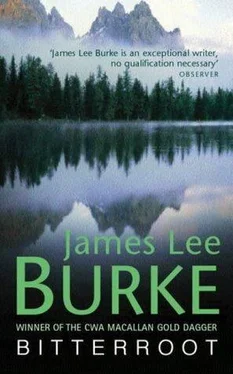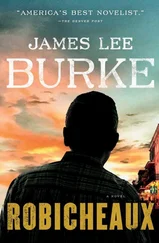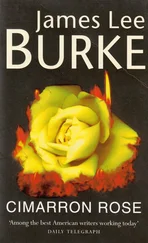We went through the little town of St. Regis, then turned off the four-lane under a train trestle and entered a hollow traversed by a dirt road that was dotted with clapboard houses on each side. The yards were strung with washlines and littered with debris, like a scene out of Appalachia.
The sheriff had said very little during our journey.
"See all that old growth timber up there? That's the way it used to be everywhere," he said. "We didn't have cyanide in the river and runoff from the clear-cuts destroying the spawning beds. We didn't have no Aryan Nation or Christian Identity or militia people coming in here from Idaho, either. You know why they like it up here in the woods?"
"They're cowards. They fear blacks and Jews and locate in places where they'll never have to face them on equal terms."
He turned his head and stared at me and almost drove us off the road.
"Damn, son, you may have more sense than I give you credit for," he said.
The coroner had been late in arriving at the crime scene and was just finishing his work. Two paramedics were waiting by the road with a gurney. An empty black body bag lay unzippered on top of it.
The impact of the round had blown Tommy Lee Stoltz off the porch and into the yard. A roll of toilet paper from the box of groceries he had been carrying had bounced down the steps and rolled back under the porch into a pool of brown water. Stoltz lay on his back, staring at the sky, his shattered glasses crooked on his face. The right lens was embedded in the eye socket, coated with blood.
The sheriff from Mineral County stooped under the front door and walked out on the porch and looked at me and Sheriff Cain. He had a broad stomach and red face and graying blond hair and mustache. He wore a sheep-lined vest and a blue baseball cap with the letters MCSD on it.
"Who's he?" he said to Cain.
"An ex-Texas Ranger along for the ride. What have you got?" Sheriff Cain said.
"A neighbor heard the shot and looked out the window and saw somebody in a hat and a long coat with a chrome-plated pistol. We didn't find any brass, so the shooter picked it up or he was using a revolver. I don't think we'll get much from ballistics. The exit wound and the splatter tell me that round's way up on the hillside somewheres. This one of the guys you pulled in for questioning in the Voss rape?"
"Yep," Sheriff Cain said.
"Where was the girl's father last night?"
"He says he was at home," Sheriff Cain said.
"You believe him?"
"I haven't decided," Sheriff Cain said.
"J.T., you quit running these morons into my jurisdiction," the Mineral County sheriff said.
"You folks got a lot more room over here," Sheriff Cain said.
The Mineral County sheriff lit a pipe and smoked it out on the road while the paramedics loaded the body into an ambulance. I was beginning to look at Sheriff Cain in a new light.
"Why'd you introduce me as an ex-Ranger and not as Doc Voss's attorney?" I asked.
"I felt like it. What do you think Stoltz got hit with?" he said.
"Something big. Probably with a jacket on it."
"A.44 Magnum?"
"Maybe."
"Dr. Voss has got one registered in his name."
"There're.44 Magnums all over this state." And in my mind's eye, I saw the heavy, chrome-plated revolver that Cleo Lonnigan had used to threaten Nicki Molinari at her house. "You really figure Doc for this?"
The sheriff squinted at the sun breaking over the top of the hollow and chewed on the end of a toothpick until it was flat.
"Whoever killed Stoltz just wanted him dead. The person who killed Lamar Ellison wanted him to suffer first. I think we got two different perpetrators," the sheriff said.
"I think you're an intelligent man."
"Your friend ain't off the hook. Come on, let's eat breakfast. I been up since four. I got to find me another job. This morning my old woman told me I'm the reason our grandkids are ugly," he said.
"Doc didn't kill Ellison, Sheriff."
"How do you know?"
"He would have made Ellison fight for his life. Then he would have cut him from his scrotum to his throat."
"That'll make a fine defense, won't it?" he replied.
Friday evening Lucas walked up from his tent on the river and took a shower in Doc's house and was combing his hair in the mirror when I inadvertently opened the bathroom door on him. His cheeks glowed with a fresh shave and his back was white and cuffed with sunburn around the neck.
"Where you headed, slick?" I asked.
"To see Merle Haggard. He's playing at a place called the Mule Palace. You ever been there?" His words were hurried, as though he wanted to distract me from an impending question.
"No, I've never been there. Who you going with?"
"Sue Lynn Big Medicine."
"Tell me, bud, did you come all the way up here to see how much grief you could get into?"
"Since you're already pissed off at me, can I share something else with you?"
"What might that be?" I said.
"I need to borrow your truck," he replied.
Ten minutes later I watched him shine his boots on the porch and slip them on his feet and walk back down to the tent and put on a long-sleeve white cowboy shirt embroidered with roses and his wide-brim cream-colored straw hat, with a scarlet cord around the crown, and climb into my truck and start the engine.
But before he could get out of the yard I waved my hand to stop him. He wore mirrored sunglasses, and I could see my reflection bending down toward him, distorted, a bit comical, the constant deliverer of rhetoric that was meant to compensate for my years of absence as a father.
He waited for me to speak. When I didn't, he said, "What was you gonna say?"
"Nothing. Y'all have a good time."
"Say, you couldn't let me have a ten-spot till I cash a check, could you? Tickets are twenty-five dollars," he said.
I ate supper with Doc and Maisey, then took a walk along the river and threw pinecones into the current and watched them float downstream into the shade. I saw L.Q. Navarro sitting in the fork of a cottonwood tree.
"Quit picking on that Indian gal," he said.
"She keeps company with people you wouldn't spit on, L.Q. Don't lecture at me."
"You got a way of getting upset when that boy takes up with minority people."
"That's a dadburn lie."
"Then leave him alone."
"All right, I will. Just stop pestering me."
"Where you goin?" L.Q. said.
"None of your business."
I walked back to the house and called Temple Carrol at her motel in Missoula. "You like Merle Haggard?" I asked.
Temple picked me up at Doc's and we drove back down the Blackfoot highway toward Missoula. The sun was still above the mountains in the west, but the bottom of the canyon was already in shadow. When the wind gusted, the leaves of the cottonwoods and aspens along the riverbank flickered like paper against the copperish-green tint of the current.
"Your hot water bottle occupied tonight?" Temple said.
"Pardon?"
"Your girlfriend, the one who works at the clinic on the Reservation."
"I haven't seen her."
"A friend ran her name through NCIC. He got a hit."
"Cleo?"
"Her ex-husband was Mobbed-up with a gangster named Molinari on the West Coast."
"I know all about it," I said.
"Good," she said, and didn't speak again until we reached the top of the long, timber-lined grade that fed into the Jocko Valley.
The concert was being held outdoors on the edge of the Flathead Indian Reservation. The sun had just gone down behind the mountains, and the hills were plum-colored and the floor of the valley a dark green under a light-filled sky that gave you vertigo when you looked directly up into it. The air was heavy with the cool smell of water in irrigation ditches and the pine trees that were in shadow on the hillsides and the faintly acidic warm odor of mules and horses penned outside the viewing stands. To one side of the stage, concessionaires were grilling sausages and hamburgers on open pits and selling beer and soda pop out of galvanized horse tanks swimming with crushed ice. Merle Haggard had just walked out on the stage with his band, and the crowd on the cement dance slab was shouting, "Hag! Hag! Hag!"
Читать дальше












